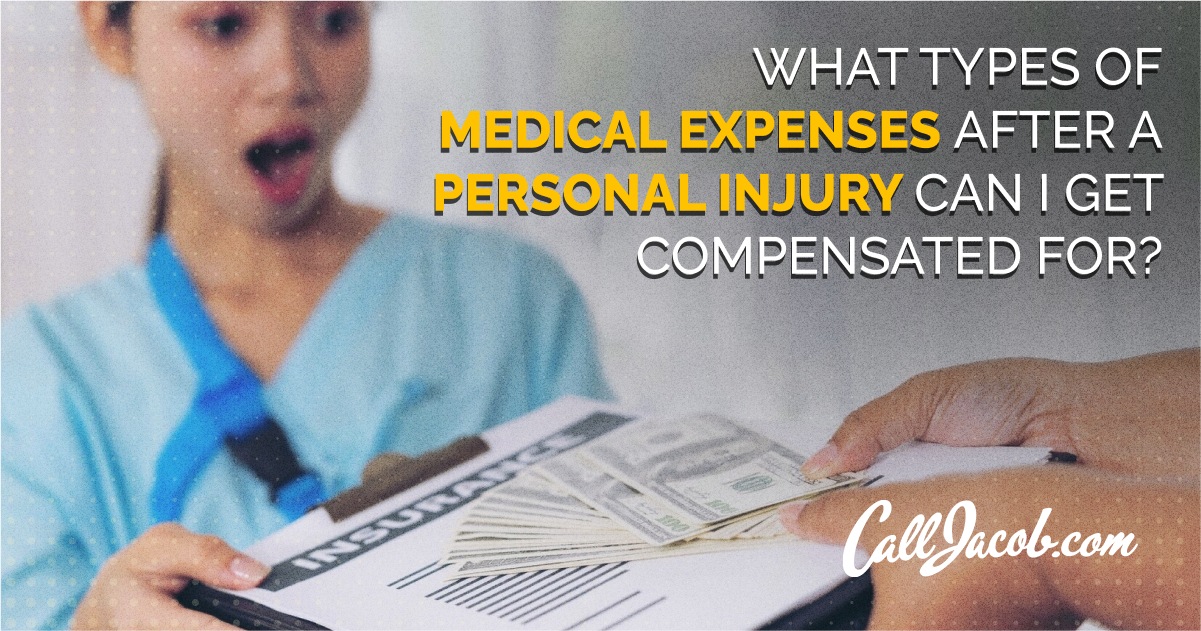What Types of Medical Expenses After a Personal Injury Can I Get Compensated For?

Medical expenses after a personal injury often reach into the tens of thousands, if not hundreds of thousands of dollars. In California, the minimum amount of liability insurance is $15,000 per person and $30,000 per accident.¹ Whether you’ve been injured in a car accident, a slip and fall, or any other accident, your medical bills can be much higher than that (depending on your injury). Of the types of damages in a personal injury lawsuit, medical expenses are among the most substantial.
However, the person who caused the accident or whose neglect led to it may be liable to compensate you for damages. When an accident involves a personal injury, there are many types of medical expenses one can be covered for.
Medical Expenses You Can Include in a Personal Injury Claim
The costs of medical care add up quickly after a personal injury. These are some types of medical treatment and services that can be included in your compensation:
- Ambulance Fees: Medical expenses start adding up as soon as the ambulance arrives on the scene. In 2023, the average ambulance ride in California cost over $1,200. A new law limits how much ambulance operators can charge.²
- Emergency Room Visits: In California, the average ER visit costs $2,960 before insurance kicks in.³ Patients may require a range of emergency diagnostic tests and surgical procedures. The initial treatment and examination of an injured accident victim is crucial in helping them recover and determining the cost and extent of their injuries.
- Diagnostic Tests: Patients are billed for each X-ray, CT scan, MRI, and other imaging or diagnostic test they receive. From diagnosing an injury to monitoring its healing or progression, these are an important and expensive part of medical care.
- Surgical Intervention: Personal injury victims often require repairs to internal organs and connective tissues, orthopedic procedures, and reconstructive surgeries. The anesthesiologist, surgeon, and other staff must be paid.
- Prescription Medications: You may be prescribed medication for managing pain, preventing infection, and other issues related to your injury. The cost of some medications can be quite high. Fortunately, compensation for medical expenses can include prescription costs.
- Specialist/Follow-Up Appointments: Every appointment with a primary care physician, surgeon, or specialist is charged for. Each is necessary for ongoing treatment and monitoring your recovery. Since these visits are related to the injury sustained in an accident, you should be compensated for them.
- Rehabilitation: To properly recover and restore functionality to damaged joints or limbs, you’ll need the help of physical therapists, occupational therapists, and others. Your personal injury settlement can cover these costs so you can afford to reach maximum potential recovery from your injuries.
- Assistive Equipment/Care: Injury victims often require wheelchairs, crutches, prosthetics, in-home nursing care, and other supportive equipment and services, depending on the severity of their injuries.
- Mental Health Counseling: Treating the emotional and psychological trauma that follows an accident can be costly. Many accident victims suffer from anxiety or post-traumatic stress disorder afterward.
You can be compensated for all of these in your personal injury settlement. An attorney can make sure the insurance company pays up and that other resources can be tapped into if a defendant’s policy doesn’t cover all your medical expenses. It’s also possible to get compensated for future medical expenses after a personal injury, accounting for the estimated costs of:
- Ongoing medical care
- Required treatments
- Surgeries
- Rehabilitation
- In-home care
How Do I Prove These Medical Expenses During a Lawsuit or Trial?
Your injuries and treatments must be well-documented using evidence such as medical records from healthcare providers. Medical bills, invoices, and receipts are also important in connecting the accident, your injury, and the associated costs. The testimony of medical professionals, vocational rehabilitation experts, and the plaintiff is helpful as well.
Who Compensates Me for Medical Expenses After a Personal Injury?
The other driver’s insurance company should cover your medical bills if you’re not at fault for the accident. If you are at fault, your health insurance or auto insurance provider will likely pay your medical bills. MedPay coverage pays for medical bills regardless of who was at fault for the accident.
What Is Not Covered by Personal Injury Compensation?
Even if you’re injured in an accident that’s not your fault, you may still have to pay your health insurance policy’s deductible, required co-payments, and charges it typically does not cover. Healthcare insurers often require repayment later. Therefore, they place a medical lien against your settlement earnings. Your attorney will help manage the legal process and distribution of payments after you receive a settlement.
Call The Law Offices of Jacob Emrani
We have awarded personal injury clients millions of dollars in damages. In addition to medical expenses after a personal injury, loss of income, property damage, and legal fees can add up. Our Los Angeles personal injury attorneys provide high-quality representation and factor in all accident-related costs so you get the compensation you deserve. To get started, schedule a free consultation by calling (888) 952-2952 today.
Sources:

Leave A Comment